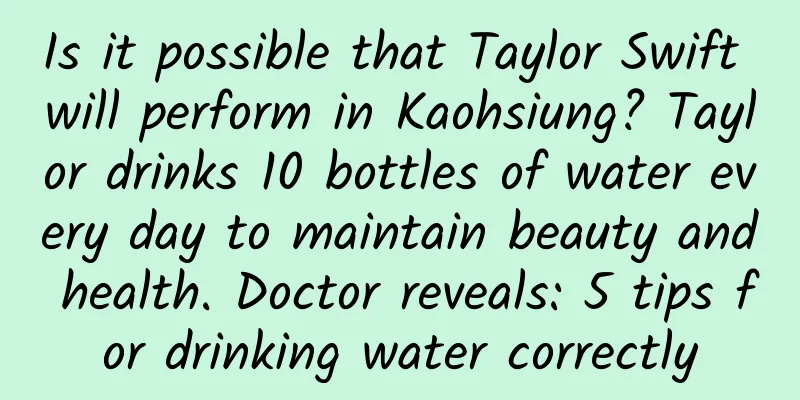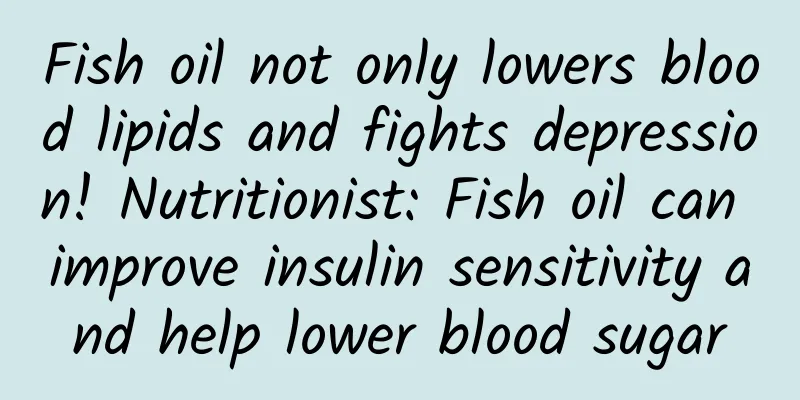Is it possible that Taylor Swift will perform in Kaohsiung? Taylor drinks 10 bottles of water every day to maintain beauty and health. Doctor reveals: 5 tips for drinking water correctly

|
Taylor Swift, the young American pop diva, is currently on her "The Eras Tour" world tour. Coincidentally, Kaohsiung Mayor Chen Chi-mai recently shared a photo of a yellow duck in Kaohsiung on Instagram, with Taylor's songs playing as the background music. Netizens left comments such as "Is this a hint?" and "Hope to hear Taylor sing "Love Story" at the World Games in Kaohsiung." Chen Chi-mai responded, "We are looking forward to it and wish for it. Dreams are the most beautiful." In addition to her charming voice, what other secrets does the 34-year-old Taylor have to keep her charm so popular with fans around the world? Urologist Lu Jinheng said that American pop music superstar Taylor Swift, whose charm has swept the world, also had appearance anxiety during her transformation from a country girl to a queen. She once revealed this in an interview with international media Bon Appétit in 2012. She carries a water bottle with her every day and drinks 10 full bottles of water a day. In addition, regular exercise and avoiding sugary foods are her secrets to beauty and health. Taylor Swift works, sings and exercises a lot, so she can drink 10 bottles of water (about 5000-6000) ml every day. So how much water does the average person need to drink in a day? The amount of water needed by the human body can be estimated by body weight (kg) x 30cc. For example, a person weighing 60kg needs to drink about 1,800cc of water per day. Therefore, for an average adult, it is recommended that they drink about 2,000cc to 3,000cc of water per day. In addition, a normal person naturally sweats about 300cc a day. If there is strenuous activity or the weather is hot, the sweat volume can be as high as 2,000cc, and at this time, 5,000cc to 6,000cc of water is needed. Taylor Swift's water intake fits this description. However, one cannot help but wonder: Will drinking too much lead to water poisoning? What is the upper limit of water intake in a day?Urologist Lu Jinheng said that everyone's situation is different, and there is no standard upper limit for drinking water. For example, the amount of water required by a worker working under the scorching sun and sweating profusely is very different from that required by an office worker who stays indoors with air conditioning and handles paperwork. Can drinking too much cause water intoxication?People with normal body functions rarely get poisoned by drinking water, as their kidneys will regulate their bodies based on the body's osmotic pressure, total body water volume, and blood sodium concentration. Forcing yourself to drink water can cause uncomfortable feelings such as nausea and vomiting. Water intoxication may be an abnormal mental or physiological state that is unable to self-regulate. Or drinking too much water in an instant can cause the salt in the blood to be suddenly diluted and cause hyponatremia. For example, marathon or triathlon runners may suffer from water poisoning if they replenish a large amount of water in a short period of time. Doctor Lu Jinheng shares the following 4 tips to determine whether you are dehydrated: 4 ways to determine whether there is water shortage1. Observe the color of urine: If the color of urine is darker than beer, it means you should drink water. It is best to drink it when it is light yellow or even colorless and transparent. 2. Judging from the amount of urine: A person excretes 1400 to 1500cc of urine a day. Every time the bladder stores about 200 to 300cc, he or she will want to go to the toilet, so normally one urinates about 5 to 7 times a day. If you go to the bathroom less than four times throughout the day, it means you need to drink water. 3. Press your hands and feet to see if they are swollen: If you press your hands and feet and the skin becomes swollen and does not bounce back, it means you have drunk too much water and there is a problem with your urination function. If the skin on your hands and feet is too dry and has too many wrinkles, it means that you are not getting enough water. 4. Are you dehydrated? When you do not take in enough water and begin to become dehydrated, your body will show some warning signs. Such as: severe thirst, light-headedness, drowsiness, poor judgment, dry lips, rapid heartbeat, and painful muscle cramps. In addition, without sufficient water, the kidneys cannot excrete toxins from the body, resulting in electrolyte imbalance, uremia, and deterioration of kidney function. In addition, there are 5 ways to drink water correctly: To avoid burdening the body, drink water in small amounts and frequently, no more than 200cc each time and no more than 1000cc within an hour. 5 tips for drinking water correctly1. Drink a glass of water when you wake up: If you haven’t consumed any water the whole night, drink a glass of 300-500c.c. warm water slowly after you wake up. This can promote gastrointestinal motility, prevent constipation, and eliminate toxins from the body. 2. Drink a glass of water before and after meals: Drink 300-500cc of water in several times at least half an hour before or after meals. People who want to lose weight can drink 500cc of water before meals to reduce the capacity of the stomach. 3. Bring water when going out: Replenish water at all times when exercising to increase blood circulation and avoid dehydration. 2 to 3 hours before exercise, you can replenish 500cc of water; during exercise, regularly replenish 200 to 300cc of water every 10 to 20 minutes to avoid drinking too much water at one time. 4. Drink water in small amounts and frequently: In order to avoid burdening your body, drink water in small amounts and frequently. The amount of water you drink should not exceed 200cc each time, and no more than 1000cc of water within an hour. If you drink too much water at one time, your kidneys will receive the signal that you have taken in too much water, which will speed up urination and the water will not have enough time to be delivered to various parts of the body. 5. Don’t drink too much water before going to bed: Don’t drink too much water two hours before going to bed to prevent nocturia and improve sleep. Finally, I would like to remind you that people with the following diseases need to drink more water, and some ethnic groups and diseases should drink less water: Who needs to drink more water?People with diabetes, gout, colds, constipation, urinary stones, kidney stones, high blood pressure, and arteriosclerosis need to drink more water to promote metabolism and help excrete toxins, metabolites, uric acid, and stones from the body. Who should drink less water?The weak, seriously ill, elderly, and those with end-stage renal failure and heart failure need to limit water intake to avoid pulmonary edema and lower limb edema. 👉Recommended reading: How much water should you drink in a day? Do you have to drink 8 glasses of water? Hou Wenyi's nutritionist: Don't ignore the 4 warning signs of dehydration 👉Recommended reading: If you don’t drink enough water, be careful of urinary tract infection. Can you only eat cranberries? Chinese medicine doctor Wu Mingzhu: 3 teas to protect kidneys and promote urination |
Recommend
Expert introduction: What are the common causes of adnexitis?
Many female patients only know that they need to ...
Do shoulder blade stretching exercises to relieve back and shoulder pain
Shoulder pain, back pain Once the hip joint or pe...
What to eat in winter is easy to get uterine fibroids. What to eat in winter is good for the uterus.
What to eat in winter is easy to get uterine fibr...
What are the main symptoms of pelvic inflammatory disease?
Among the diseases of the pelvic area, pelvic inf...
How to treat primary amenorrhea
The treatment of primary amenorrhea requires spec...
What are the symptoms of uterine fibroids at a young age? What should I do if I have uterine fibroids at a young age?
What are the symptoms of uterine fibroids at a yo...
Should I eat the rice first or drink the soup first? Weight Loss Doctor: Eat each meal for no less than 20 minutes
What is the order of eating three meals, do you e...
How much ectopic pregnancy surgery does it take to get pregnant?
How much ectopic pregnancy surgery does it take t...
What are the best treatments for pelvic inflammatory disease?
What are the best treatments for pelvic inflammat...
Diet too much and you won't wake up during the day, beware of hypoglycemia
Control your diet to keep in shape, but don’t ove...
6 reasons for raising a fat child - easy self-diagnosis
Mingming, 7 years old, has loved fried food and h...
Eat the Mediterranean diet to prevent aging: grasp 5 principles and avoid 1 trap
The Mediterranean diet is the most popular health...
How to treat multiple uterine fibroids? How to treat multiple uterine fibroids with traditional Chinese medicine?
As we all know, although there are many ways to t...
How long does it take to cure cervical warts?
How long does it take to cure cervical warts? Cer...
Can I get pregnant after having amenorrhea?
Amenorrhea after childbirth is usually caused by ...









